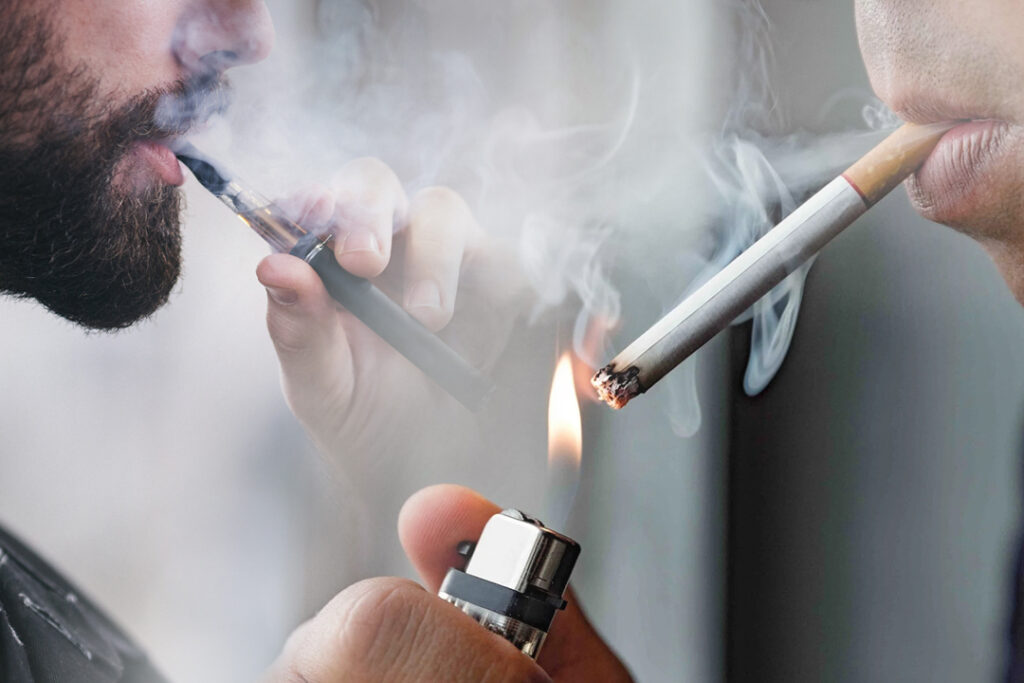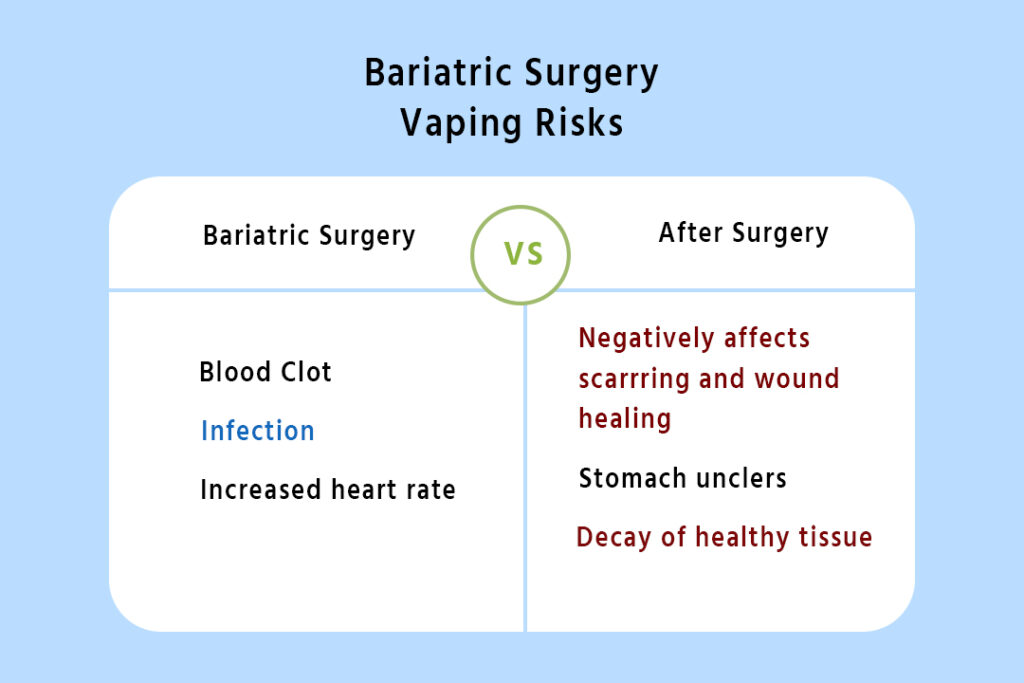
Vanshika
Bariatric Dietician & Content Writer

Vaping safer than smoking? Is vaping fine after Bariatric surgery?
Neither smoking nor vaping is beneficial to human health. Based on the available evidence, smoking appears more harmful than vaping. However, this does not mean that vaping is safe.

- Long-term effects of vaping –
Research generally accepts that vaping can harm the lungs and other bodily systems, though its impact is much less than tobacco & smoking; it’s not completely safe or recommended. A study into the long-term health effects of vaping found that people using e-cigarettes had a higher risk of respiratory disease than people who never smoked.
Vaping may:
damage the lungs
release free radicals, which promote cancer development, into the body
weaken the immune system
delay brain development in fetuses, children, and teenagers
Some people also report sustaining burns when recharging e-cigarettes due to defective batteries leading to explosions.
It may also hinder your healthy weight loss
People who vape may be at risk of harm for the following reasons:
E-cigarettes can contain a large dose of nicotine, a substance known to slow the development of brains in fetuses, children, and teens.
The liquid that creates the vapor is dangerous to adults and children if they swallow, inhale, or get it on their skin.
Vaping also delivers dangerous chemicals, including diacetyl, cancer-causing chemicals, heavy metals, and volatile organic compounds (VOCs).
Vaping may normalize smoking again as it becomes more popular.
Vaping refers to the act of inhaling and exhaling the aerosol produced by an electronic cigarette or similar device. While research on the long-term effects of vaping is still evolving, there are several reasons why bariatric patients are advised against vaping:
- Respiratory health: Bariatric patients may already have compromised respiratory function due to their excess weight or obesity. Vaping can potentially exacerbate respiratory issues by introducing foreign substances into the lungs and airways, which may lead to inflammation and breathing difficulties.
- Nicotine addiction: Many vaping products contain nicotine, which is highly addictive. Bariatric patients are often encouraged to adopt healthier lifestyle choices after surgery, including quitting smoking and avoiding addictive substances. Nicotine addiction can have negative health effects, and it may hinder the progress made in weight management or overall well-being.
- Nutritional concerns: Some bariatric procedures impact the body’s ability to absorb certain nutrients effectively. Vaping may interfere with the absorption of essential vitamins and minerals, potentially exacerbating nutritional deficiencies that can already be a concern after bariatric surgery. However, deficiency caused by the surgery can be compensated with proper diet plans and healthy dietary habits, but the one caused by vaping may be worse and difficult to work upon.
- Potential health risks: Although vaping is generally considered less harmful than traditional smoking, it is not risk-free. E-cigarettes and vaping liquids contain various chemicals, including flavorings, propylene glycol, and glycerin. The long-term effects of inhaling these substances are still not fully understood, and there have been cases of lung injury associated with vaping.
The use of e-cigarettes, personal vaporizers, mods, and other vaping devices has grown significantly in India and other parts of the country. Approximately one in five adults currently vape or use vaping products, which continues to rise in popularity for young adults and those who are overweight or obese.
In conclusion Vaping and smoking share similar negative effects on the body, such as damage to the lungs and increased cancer risk.
Researchers know more about the long-term effects of smoking than those of vaping. However, vaping products contain a great deal fewer harmful chemicals than cigarettes and can be an effective tool in quitting smoking altogether.
While vape products can reduce the amount of tar and other chemicals a person inhales, they can increase a person’s nicotine dependency.
Vaping Instructions Before Bariatric Surgery
It’s imperative to stop vaping 3 to 6 weeks before surgery. Staying vape-free for 3 to 6 weeks after surgery can maximize healing and recovery while having a significant impact on reducing complications. According to the American Association of Nurse Anesthetists, vaping liquid may significantly increase the risk of complications associated with surgery and anesthesia.

What Happens if I Vape Before Bariatric Surgery?
According to the American College of Surgeons (ACS) Clinical Congress, “Studies show smoking and vaping before an elective operation doubles the risk of postoperative pneumonia and increases the risk of a heart attack by 70 percent.”
Pre-op bariatric surgery vaping risks
Unstable blood pressure
Reduced blood flow
Blood clot
Infection
Increased heart rate
Oxygen d eprivation to vital organs
Hypertension
Myocardial contraction
Endothelial dysfunction
Lipid increase
Hemodynamic instability
Sometimes death
Seizures
The harmful effects of nicotine on the circulatory system can cause irregular or unstable blood pressure (hemodynamic instability) when a person is under general anesthesia. Additionally, it has been demonstrated that smoking negatively affects blood flow, heart rate, and blood pressure.
What Happens If I Vape After Surgery?
The detrimental effects of smoking traditional and electronic cigarettes are equally the same. Because nicotine constricts blood arteries, less blood reaches the skin and other tissues. Furthermore, it makes blood platelets, which are implicated in clotting, more likely to clump together. As a result, blood circulation is decreased, particularly to tiny microvessels in the epidermis, making it far more difficult for the body to heal wounds.
Post-Op Bariatric Surgery Vaping Risks
Negatively affects scarring and wound healing
The potency of some post-operative drugs
Surgical site infection
Increase stomach gas
Painful bloating, hiccups
Potential gastric tear
Decay of healthy tissue
Stomach ulcers
Best Methods to Quit Vaping Before Surgery
Vaping can be incredibly difficult to quit. Yet the rewards are substantial in improving overall health, finances, and timeliness. For lifelong smokers, this can feel like an impossible task to accomplish. There are effective ways to quit vaping if you are scheduled for weight loss surgery and need a strategy to get through the breakup. Slowly weaning off or reducing the nicotine contents is one of the best methods to stop vaping products for good.
Reduce the nicotine levels in your cartridge over time until you can use nicotine-free cartridges and smoothly quit smoking completely with minor withdrawals.
Vape in moderation, ween off by vaping less. Every 3 days, add another hour between the time you typically puff the vape. In 15 – 21 days, you will only hit the vape once or twice a day. From there, the withdrawals are minor, and you can fully prepare for surgery.
Exercise!By boosting endorphin levels through exercise, you can achieve the same effect on thebrain without vaping.
Distractions – If you can give your cravings a few minutes to pass, they will. It will go more quickly if you use a distraction to deliberately divert your attention from the urge.
Create a successful setting for yourself. Establishing a home free from temptation, such as by getting rid of anything that makes you think of vaping. Make sure there are no e-cigarettes or other vaping supplies in your space. Then, let your pals know you’re attempting to stop so they don’t bring around vaping devices that can cause a craving.
Cope with your life stressors. When under stress, many people turn to vape, which creates a circle of cravings. Finding a solution to your stressor, going for a walk, or doing yoga can all help you feel better.
Celebrate your successes. When you’re trying to stop smoking, recognizing your accomplishments will help you become more resilient to stress and cravings. Share your achievements by posting your victories on social media.







